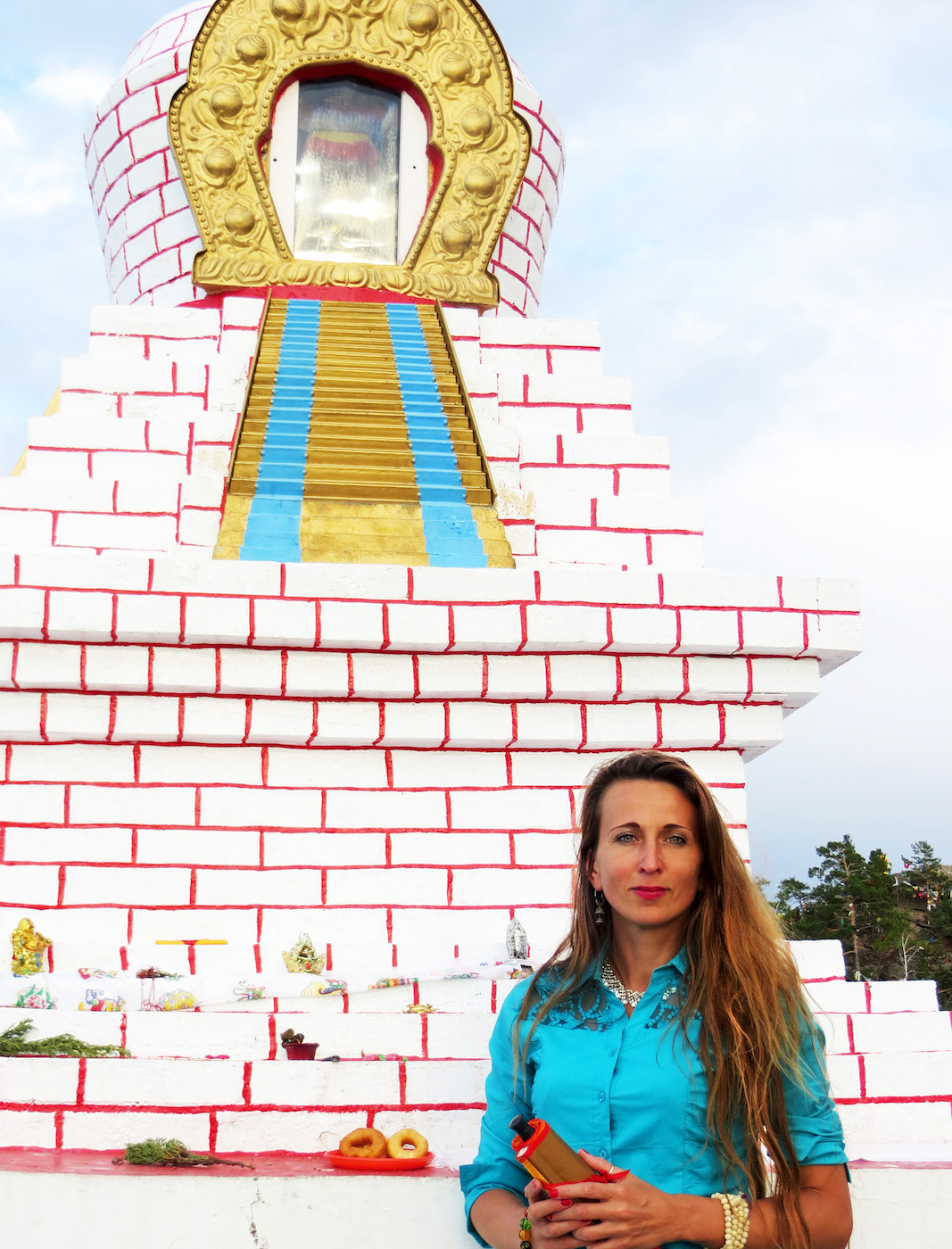FEATURES|THEMES|Travel and Pilgrimage
Footprint of the Buddha: Burgan Izi, the Holiest Site in Tuva
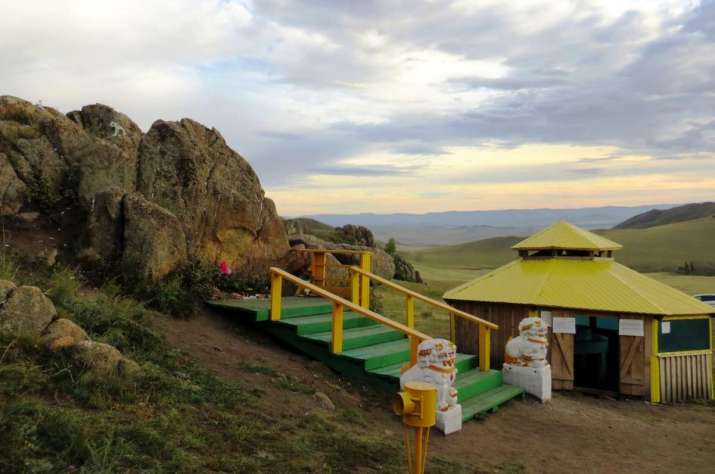 Burgan Izi. Image courtesy of the author
Burgan Izi. Image courtesy of the authorThere are places in the world that have the power to transform our minds and that remain forever imprinted within our hearts. They are sacred and memorable and we cherish them like a beloved person. These holy places have special importance in the Buddhist tradition and inspire devotees, increasing their faith and reminding them of stories or people of particular importance. These reminders or memorials (Skt: caitya) in Buddhism are places and objects used to remember Shakyamuni Buddha. Such objects include his footprints (Skt. buddhapada), which symbolize that Buddha was present on Earth and left a spiritual path to be followed. There are two forms of caitya: natural, as found in stone or rock, and artificial. Many of the so-called “natural” ones are replicas or representations of the footprints of the Buddha, which can be considered relics and also early aniconic and symbolic representations of the Buddha.
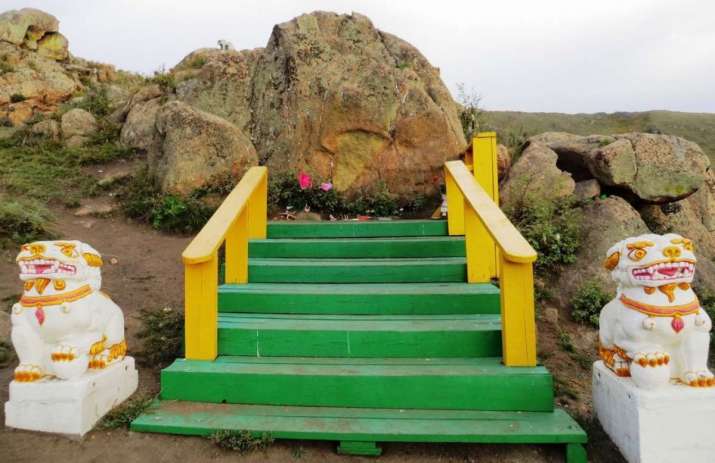 The footprint of the Buddha. Image courtesy of the author
The footprint of the Buddha. Image courtesy of the author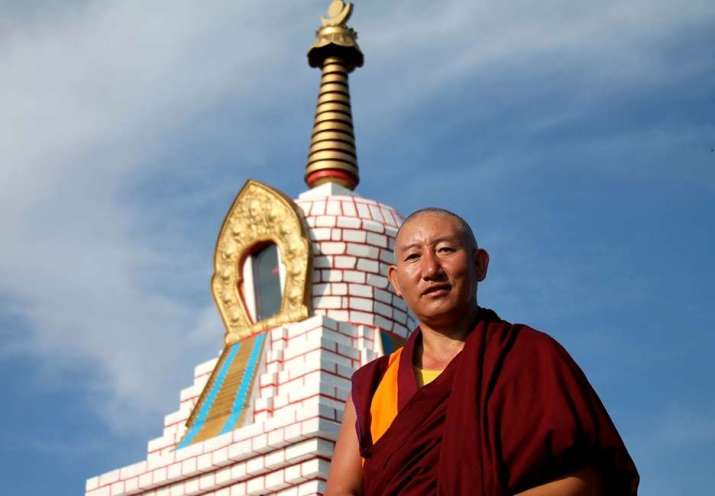 Shiwalha Rinpoche in front of Lhabab Chorten. From savetibet.ru
Shiwalha Rinpoche in front of Lhabab Chorten. From savetibet.ruOne of the most incredible Buddhist places, which has deeply touched my heart, is located in the remote Russian republic of Tuva. It is called Burgan Izi (from the Tuvan language: “Footprint of the Buddha”) and is considered one of the holiest sites in the southern Siberian republic. Burgan Izi is located on a hill in a beautiful mountain range between the villages of Tselinnoe and Shambalyg, to the southeast of the Tuvan capital Kyzyl.
According to local legend, some years ago, when His Holiness the Dalai Lama flew over Tuva,* he saw the glowing light of the Buddha’s footprint on the ground. He informed the local Buddhist lamas of this and they found the sacred footprint on a rock. Since then, Buddhists from Tuva and all over the world have come to this sacred place for pilgrimage and to conduct sacred rituals and ceremonies. One of the most popular rites conducted in the region is san salyry, which is a symbolic offering to the spirit of the sacred mountain and a kind of bloodless sacrifice, purifying the area from the influence of evil spirits. It is believed that the Buddha's footprint in Tuva is “alive.” At the beginning it was in a horizontal position, and over time has decreased in size and taken on a vertical position. Devotees have built an offering pedestal and a seven-step stair at the site.
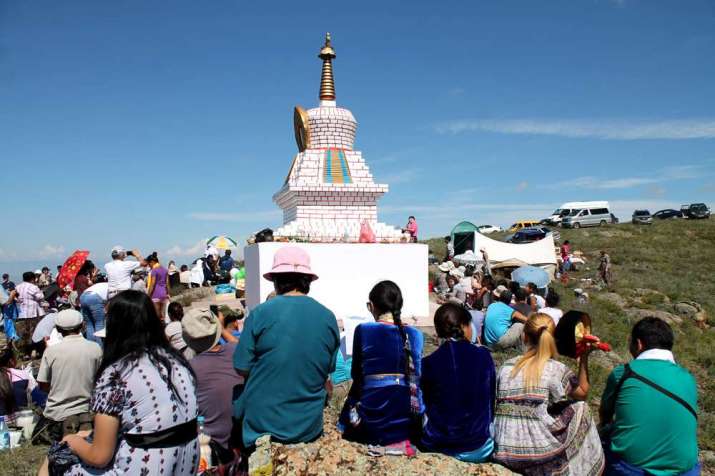 Gathering for the consecration of Lhabab Chorten. From savetibet.ru
Gathering for the consecration of Lhabab Chorten. From savetibet.ru
The author in front of Lhabab Chorten. Image courtesy of the author
At the foot of the sacred rock is a stupa (Tib: chorten) dedicated to one of the four major Buddhist holidays, Lhabab Duchen (from the Tibetan “Festival of the Descent from Heaven”). The stupa, known as Lhabab Chorten, was consecrated in September 2013 by Shiwalha Rinpoche. A Tibetan lama of the Gelug school, Rinpoche has been recognized by His Holiness the Dalai Lama as the eighth reincarnation of the eighth century Indian Buddhist monk Shantideva. Shiwalha (Tibetan translation of Shantideva) had been living in the Russian republic for more than 10 years, but in 2015 was deported by the Federal Security Service (FSB), Russia’s principal security agency and the main successor of the former USSR’s Committee of State Security (KGB).** In 2013, Rinpoche inaugurated two stupas—Lhabab Chorten and Namgyalma Chorten—in the village of Aldan-Maadyr, Sut-Kholsky Region. The opening of the two stupas was attended by the Buddhist clergy of Tuva, led by the late Sixth Kamby Lama, Tsultim Tenzin (Suldum Bashky), the most senior Buddhist monastic in Tuva, and Lama Ngaramba (Doctor of Tantric Sciences) Tubten Shakya, who performed special consecration rituals.
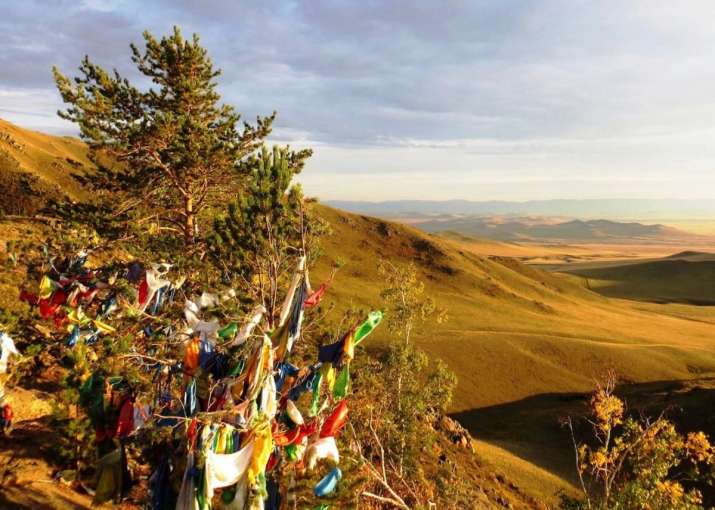 Ceremonial scarves at Burgan Izi. Image courtesy of the author
Ceremonial scarves at Burgan Izi. Image courtesy of the author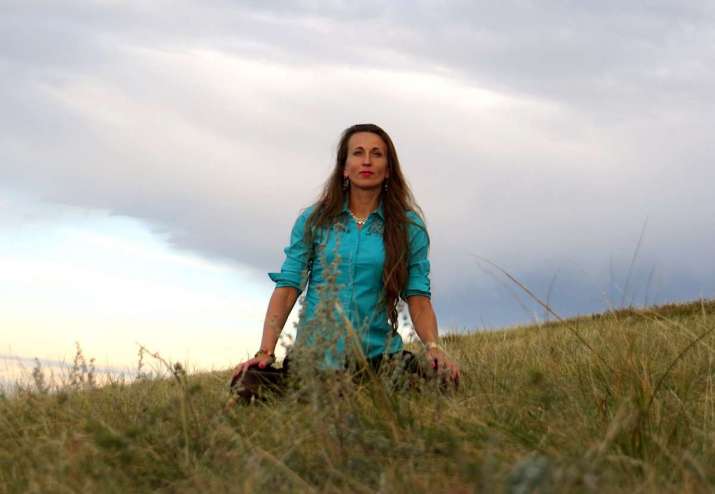 Listening to the silence. Image courtesy of the author
Listening to the silence. Image courtesy of the authorShiwalha Rinpoche compares the area of Burgan Izi with one of the holiest Buddhist places in India—Rajgir in Nalanda District of Bihar State—and also with sacred places in Tibet. He has said that the footprint of the Buddha can be found not only in India but also in Tuva, and that everything depends on faith and pure perception. In 2015, the year he was deported, Rinpoche led a large ceremony at Burgan Izi to celebrate Saka Dawa, which was attended by hundreds of devotees from Tuva and other parts of Russia.
Burgan Izi has become a major pilgrimage destination in Tuva and a symbol of the faith and devotion of the local people. I had an opportunity to visit the sacred site in 2016 during the international scientific conference “Buddhism in the Third Millennium: Trends and Prospects for Development.” It was truly a magical experience to pay homage to the footprint of the Buddha, to circumambulate around the majestic stupa, and to meditate in the vast open space, feeling the power of the Dharma beyond time and space. There was an atmosphere, charged with faith and devotion, in which prayers, hopes, and aspirations filled the space, along with the countless khatag (ceremonial scarf) and lungta (prayer flags).
Contemplating the vast space of this holy site, immersed in complete silence and untouchable beauty, I heard the sound of emptiness and echoes from the silence of the Awakened One. The echo of his enlightened wisdom and his footprints remind us of his path, of opening our minds, and of the gate to liberation.
* His Holiness the Dalai Lama made his first and only visit to Tuva in 1992.
** Russia Orders Buddhist Leader Shiwalha Rinpoche to be Permanently Deported (Buddhistdoor Global)
See more
Ступы Намгьялмы и Лхабаб чортен возведены в Туве под руководством досточтимого Шивалха Ринпоче
Related news reports from Buddhistdoor Global
Ninth Kamby Lama Elected in Tuva Republic
Russian Buddhists Request Prayers for the Health of Kamby Lama of Tuva, Diagnosed with COVID-19
Eighth Kamby Lama Enthroned to Lead Buddhist Sangha in Tuva
National Museum of Tuva Hosts Exhibition of Buddhist Relics
Jhado Tulku Rinpoche Visits Moscow, St. Petersburg, Kalmykia, and Tuva
Kalmyk Musical Performance of the Buddha’s Life Presented in Tuva and Buryatia
Related features from Buddhistdoor Global
Buddhist Temple Dedicated to the Dalai Lama Under Construction in Tuva
Tuva: Sacred Land of Turkic Shamanism and Tibetan Buddhism
Russia’s Golden Triangle of Buddhism
International Conference in Tuva Marks Revival of Buddhism in Central Asia

